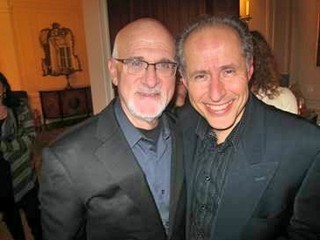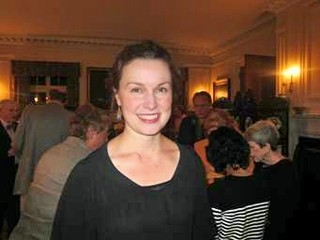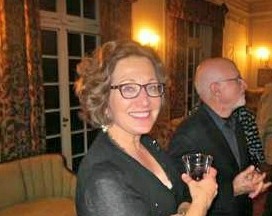|
Back
The Birds And the Forest Breeze New York
Copland House, 455 Bayram Lake Road, Merestead, Mount Kisco
09/20/2014 -
Season Opening Concert, Music of Copland House: “Birds of Paradise”:
Aaron Copland: Poems of Emily Dickinson: “Nature, the Gentlest Mother”, “There was a Wind like a Bugle”, “Dear March!” & “When They Come Back”
Olivier Messiaen: Le Merle Noir
Robert Sirota: Birds of Paradise
Lukas Foss: Thirteen Ways of Looking at a Blackbird
Charlotte Dobbs (Soprano), Linda Chesis (Flute), Moran Katz (Clarinet), Ian David Rosenbaum (Percussion), Michael Boriskin (Artistic and Executive Director/Piano)

R. Sirota, M. Boriskin (© Coco T. Dog)
The 80-minute train ride from Manhattan to Merestead masks the fact that concerts at Copland House are generically and emotionally poles apart from Carnegie Hall–and the Brooklyn tenement of Aaron Copland’s birth.
No, the composer didn’t reside in this 130-acre estate (“Composers don’t live this way”, wryly said pianist Michael Boriskin). But, in a fearfully complex agreement, the estate was turned over to the Westchester Department of Parks, which it was renamed Copland House (the composer lived a few miles away), and now not only gives concerts, supports in-house composers, makes recordings and actually brings some extraordinary musicians onto its 130-acre estate.
Yet not even this potted description gives an idea of this hilltop concert hall. It lies above Bayram Lake Road, itself a winding route outside Mount Kisco, amidst dense forests with a few homes, running the gamut from 1840’s style clapboard houses, to great holdings hidden by paths from the road. A stroll here, and one comes along the most dense vegetation of pines and beeches and elms, swampy marshes, deer grazing on the massive lawns, and birds flittering through the forest. One semi-steep climb from the road, and you find yourself in a neo-Georgian mansion surrounded by more greenery, more forest...
And the solitude of Copland House is far far from the 57th Street traffic and 1900's market hubbub of Copland’s birthplace.
Within the home are autographed pictures of our Presidents, and fine watercolors. But for me, the prize was in a corner. An original manuscript, a poem by Samuel Taylor Coleridge. Which went perfectly with two of the pieces played last night, both taken other poets, these from the American halcyon.
The theme of the concert was “Birds of Paradise”, based upon a single work which was the most shimmering combinations of music and visuals I have ever seen. But before that came the Copland House’s eponymous opening, four of the twelve Emily Dickinson poems.
Previously, I had heard only Copland’s so-sensitive orchestrations. But pianist Moriskin, a noted master of all 20th Century music, delved into the work not only with excitement and assurance with all those broken rhythms, but with a sense of the picturesque. For even though these songs are relatively early, Copland had mastered the “American” portions of this great solitary poet of Amherst.

C. Dobbs (© Coco T. Dog)
Charlotte Dobbs had the most challenging part of the work, since Copland was never averse to giving her an almost cruel extremity in the vocal range. Her voice, a lovely soprano, reached a bit in the upper ranges here, but the most careful lines–the dancing rhythms of ”Dear March”, the depth of ”Nature the Gentlest Mother” sung with a depth and pure beauty.
Ms. Dobbs also showed her art in the so complex finale, Lukas Foss’ Thirteen Ways of Looking at a Blackbird. One sometimes has regrets that any of Wallace Stevens’ poetry is put to music, for his poetry is by far the most sheerly musical of all poems in the last century.
Then again, where some musicians would simply illustrate it, Lukas Foss was never afraid to take every single haiku-like verse of Mr. Stevens and give it a different texture, a remarkable color. This was a color which didn’t augment or illustrate but created a chemical physical difference.
The “orchestration” here gave that color. In one corner (as they say in boxing rings) was flutist Linda Chesis, at the back of the salon. In front was Mr. Boriskin with a “prepared” piano (quite the vogue in the 1970’s), which he shared with percussionist Ian David Rosenbaum. Not with percussion per se, but various small “tools’ (did he invent them), which were played inside the piano or making their own shrill noises outside.
With clarinetist Moran Katz, Ms. Dobbs essayed through the spatial sounds, the gentle humming of the inner piano, while piano and flute duetted and warbled through Stevens’s aphoristic joys. I have heard this with more electric excitement, but this performance was less on the volatile drama than Steven’s musical paintings.

L. Chesis (© Coco T. Dog)
Messrs Chesis and Boriskin were fine in the relatively familiar early Messaien Blackbird, but the following work was, in its singular coupling, certainly the apex of the evening.
Robert Sirota had written Birds of Paradise without going to Indonesia or New Guinea, but as an anniversary commission to the well-known Webster Trio, and afterwards discovered a video of Cornell ornithologist Ed Scholes. This, the result of many years studying the New Guinea Highland birds of paradise, was not exactly cut down, but was given the most artistic vital editing, to make it “correspond” to the music of Mr. Sirota.
I am certain that this music was wonderful, since Mr. Sirota is among the most important composers of today. But frankly, the video of the birds was so magical–in color, in movement, and even in the sounds of the birds which surprised us over and in between the lyrical clarinet, flute and piano–that I immediately searched for this miracle on YouTube.
To no avail, alas. But then, the miracle of the video is that the birds are so far away from human habitation that they have escaped the New Guinea search for plumage. They are (thank the manifold gods which exist in that country), still with us.
After the concert, though, one was back in the now dark grass and forest land surrounding that estate. No birds to be heard at 10 pm, but the crickets and the blackness and the shadows of trees, blended in with those 20th Century attempts to create the eternal wonders of avian song. And, in the words of our third greatest American poet, “I looked up in perfect silence at the stars.”
*************************************************
CODA: Admittedly, I had never heard of these concerts until this month, but they have several more coming up. For more information, go to office@coplandhouse.org.
Harry Rolnick
|